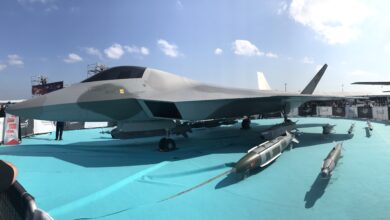Erdogan says Turkey to expand military operation in Syria to Manbij, Kobane and Qamishli
Turkey's president also threatens military operation in Yazidi heartland of Sinjar in Iraq
A day after Turkey-led forces took control of Efrin, President Recep Tayyip Erdogan on Monday vowed to expand Turkey’s campaign in Syria to other Kurdish-held territory as far as the Iraq border in the east, and again threatened a military operation against Sinjar in Iraq.
Indicating there was no plan for the Turkish army to call off its offensive after Turkish troops and Syrian opposition fighters took control of Efrin virtually unopposed on Sunday, Erdogan described the taking of the town as merely a “comma” and warned that Turkey could launch a surprise attack on Kurdish strongholds in Iraq.
He said the campaign in Syria, led by the Turkish Armed Forces alongside allied Syrian opposition fighters, could now extend as far as Qamishli, the most easterly Syrian town held by the Kurdish People’s Protection Units (YPG) before the Iraq border, and the main administrative centre for the self-declared Democratic Federation of Northern Syria.
Turkey sees the YPG as a Syrian offshoot of Turkey’s outlawed Kurdistan Workers’ Party (PKK), which has waged a decades-long insurgency against the Turkish state, but the mainly Kurdish militia is also the backbone of the U.S.-led Coalition-backed Syrian Democratic Forces that successfully expelled the Islamic State from large parts of eastern Syria including Raqqa.
Erdogan described Efrin’s capture after almost two months as a “major stage” of Operation Olive Branch, the military incursion that Turkey says is designed to increase control of its border in northern Syria.
“We marked a comma. God willing a full stop will come next,” Erdogan said.
“Now we will continue this process until we entirely eliminate this corridor, including in Manbij, Ayn al-Arab [Kobani], Tel-Abyad, Ras al-Ayn [Serekaniye] and Qamishli,” Erdogan said in a speech in Ankara.
Kurds have long held that Turkey would expand its operation to the east. In January, the U.S. representative of the Syrian Democratic Council, Sinam Mohamed, told reporters that she believed that after Efrin, Turkey would target all of northern Syria.
The symbolic importance of Kobani cannot be overstated. The city which lies to the east of the Euphrates river is where Kurds in 2015 halted a bloody six-month Islamic State onslaught with the help of U.S. airstrikes.
Manbij, a major town 100 km east of Efrin but to the west of the Euphrates is a particular geo-political flashpoint due to the U.S. military presence there, raising the risk of confrontation between two NATO allies.
After the SDF recaptured Manbij from Islamic State in August 2016, the YPG said it handed its points of control west of the Euphrates river to the SDF-aligned Manbij Military Council as it had agreed ahead of the offensive. Turkey has long disputed this version of events, and some YPG fighters remain in the city.
The U.S. confirmed it had deployed forces to the Manbij area in March 2017, saying that their role was to reassure the SDF and deter hostilities between factions on the ground, but since then Turkey-backed FSA fighters have often fired at MMC forces near the frontline.
MORE From Hasakah to Manbij: How I got shot at by rebel snipers in Syria
An incomplete agreement?
Turkish Foreign Minister Mevlut Cavusoglu said on March 13 that an agreement had been reached with the United States that would see Turkish troops stationed alongside their U.S. counterparts in Manbij and that YPG forces would leave the city.
He said the issue was to be discussed at a meeting with U.S. officials in Washington scheduled for Monday, a high-level meeting that appears to have been cancelled due to the recent sacking of U.S. Secretary of State Rex Tillerson. Cavusoglu vowed that Turkish forces will launch a military operation if the talks failed, Hurriyet Daily News reported.
U.S. Department of Defense spokesperson Johnny Michael last week told The Defense Post that the specifics of any deal would “emerge out of the work by our diplomats and experts.”
“We are not going to get ahead of the process and speculate on potential outcomes or proposals,” Michael said.
At a Monday press briefing, Pentagon spokesperson Colonel Robert Manning again declined to comment on how the U.S. might react if Manbij comes under attack, but said there was no indication that U.S. forces would leave the town.
Manning reiterated the U.S. line, saying that the Turkish offensive in northern Syria takes the focus away from the fight against Islamic State, adding that the Turkish incursion is leading to a slowdown in Coalition operations in the Middle Euphrates River Valley near Deir Ezzor.
On March 5, the Pentagon confirmed that Kurdish fighters had left the Deir Ezzor front, leading to an “operational pause” in the offensive against ISIS, and the following day a number of mostly Arab SDF factions announced the redeployment of around 1,700 fighters from fighting ISIS to defend Efrin.
“What’s going on right now is taking away our ability to defeat a very serious threat in Syria and that’s ISIS,” Manning said.
‘Turkish forces ‘may turn up in Sinjar suddenly one night’
Erdogan also again threatened a military operation in Iraq’s Sinjar region, the heartland of the Yazidi people, saying this could come any time.
Erdogan said he had told the Iraqi authorities in Baghdad to deal with PKK camps in the area, warning Sinjar risked becoming one of the group’s strongholds, like the Qandil mountain area.
“If [Baghdad] cannot, we may turn up in Sinjar suddenly one night and clean up the PKK there.”
Turkish threats against Sinjar are not new. Turkish Foreign Minister Mevlüt Çavuşoğlu in March 2017 said Turkey would conduct a military operation in the area.
“I’m not saying that we will only use military force if necessary, I’m saying that we will use military force, without question,” Çavuşoğlu said.
Earlier that month, Defense Minister Fikri Işık said Turkey was considering a joint ground operation in Sinjar alongside Peshmerga forces controlled by KDP leader Masoud Barzani, then President of Iraq’s autonomous Kurdistan region.
Erdogan himself in October 2016 suggested that Turkey would take military action if the PKK did not leave the area, and Deputy Prime Minister Veysi Kaynak reiterated in December 2016 that the Turkish military could act if the Kurdistan Regional Government did not force the PKK out.
Much has happened since then, not least the pushing back of KRG troops by Iraqi forces in the aftermath of the abortive Kurdistan independence referendum, but Sinjar’s long-standing connection with both the PKK and the YPG who came to the aid of Yazidi people attacked by ISIS, as well as the multiway tussle for control of its border with Syria, has made the area an ever more complex geo-political problem.
With reporting from AFP












